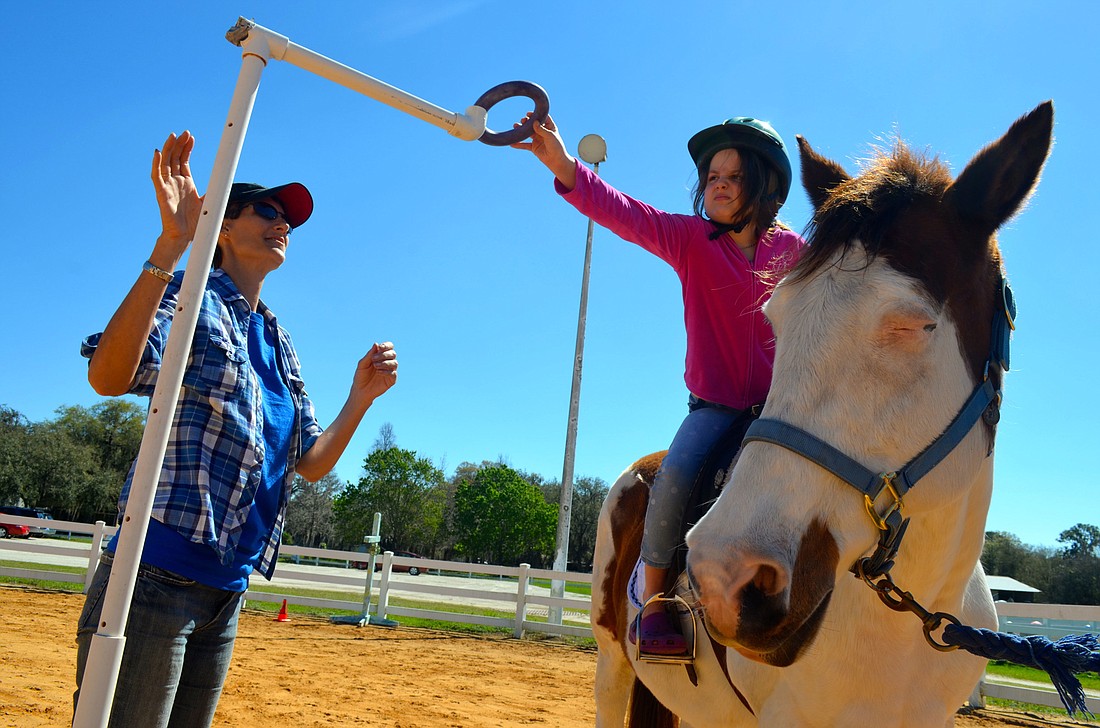- April 16, 2024
-
-
Loading

Loading

When Amy Hammon watched her 3-year-old daughter, Elle, ride on a horse that was 15 hands tall, she wasn’t nervous. She was elated.
Elle, who has a seizure disorder and is unable to go to school, is often soft spoken. However, after Hammon began taking Elle and her two other children, who also have disabilities, to Sarasota Manatee Association for Riding Therapy for regular sessions, she was able to communicate more effectively.
“My 3-year-old — who is not self-confident, who is quiet and very demurred and doesn’t speak — got on the horse, rode the horse and actually learned to say, ‘Whoa,’ which for me was priceless,” Hammon said. “To see her connect and ride with no fear, it just brought tears to my eyes.”
Hammon, who has been involved with SMART for about six months, said the organization has become a haven for her family. Staff members have helped her children, who are on the autism spectrum, learn how to handle anxiety and implement a routine and order into their lives.
According to the Equine Assisted Growth and Learning Association, equine therapy can treat a variety of diagnoses including behavioral issues, attention deficit disorder, post-traumatic stress disorder, addiction, depression, anxiety and communication needs.
Although Hammon said the programs are great for her children, they also can help people who are struggling with anxiety or depression, particularly as a result of COVID-19.
U.S. Census Bureau data from 2020 found that for every 100 adults, 34 have shown symptoms of anxiety, depression or both throughout the pandemic. The findings were a large jump from previous years, and in some cases, the number of people showing symptoms doubled from 2014.
“We could all use it to feel better about our life right now,” Hammon said. “I mean, COVID-19 has hit people hard, and it’s made us change and rethink our life goals, and this can really help you work through that.”
SMART is certified by the Professional Association of Therapeutic Horsemanship, which means it follows a set of safety standards to do its programming. SMART horse leaders often work alongside occupational, speech and physical therapists to help clients meet both short-term and long-term goals.
Through various programs, clients build muscles while riding, overcome anxiety through grooming routines and work on their speech while reading to the horses.
Terri Arnold, a volunteer coordinator of SMART, said horses often can offer a safe space for clients to open up in ways that traditional therapy often doesn’t.
According to the International Equestrian Federation, horses have several unique traits that make them a top choice for animal-assisted therapy.
Horses are nonjudgmental, which allows clients to explore their emotions without fear of judgment. Horses also are keen observers and often mirror a client’s behaviors or emotions, creating a sense of understanding between the animal and client.
“Horses are amazing in that they live in the moment and don’t judge,” Arnold said. “If someone’s having anxiety, just coming up and grooming or putting their hands on the horse and taking a breath is extremely helpful.”
Therapy sessions with horses can help clients improve their physical skills as well as develop traits including empathy, confidence, self-efficacy, emotion regulation, positive self-image and trust in others.
Although most people think equine therapy always involves a mounted session, Arnold said it can involve more than just riding a horse. In fact, in some sessions, clients won’t touch the horse at all.
SMART offers a variety of unmounted and mounted sessions depending on comfort level and need of the client.
The groundwork programs focus on practicing activities, such as feeding or grooming the horses. These activities allow individuals to choose an activity that might be outside their skill level and talk through any feelings stimulated by the activity.
Performing the activities on a weekly basis allows clients to have an activity schedule, which often might be avoided in day-to-day life. However, a sense of structure can help foster a responsible and confident client.
Mounted activities allow clients to build up muscles and muscle memory to achieve specific goals in their lives. For example, if clients have a long-term goal to ride a bicycle, they will work on strengthening core muscles and building their balance, so they can take those skills to a bike.
Sequential mounted activities, such as weaving through cones or maneuvering over a cavaletti, are good for clients who have different abilities because it builds self-confidence, Arnold said.
“We have students that are immobile, and when they’re sitting on top of the horse, they are equal with everyone else,” Arnold said. “There’s no one looking down on them, and that can be a big boost to their confidence.”
No matter what program clients choose, Arnold said the benefits and skills for people of all ages learned during therapy go hand in hand with the acquisition of basic living skills.
“Whether it’s learning how to express their emotions or how to use proper body mechanics to control the horse, all of it builds on their abilities, and it’s a big deal for them,” Arnold said.
Aside from the targeted benefits, Hammon said SMART offers her children, who often can’t compete in team sports, a place to feel welcome.
“Having your child love something and having your child be loved by something is unmeasurable,” she said. “Having your child feel successful and independent and self-confident, that is every parent’s dream.”